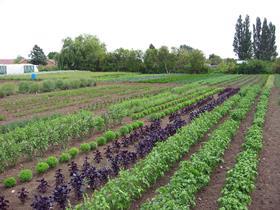
The world’s largest chemical producer BASF emerged as an unexpected winner in the Bayer-Monsanto mega-merger last month, with Bayer agreeing to sell the German chemical giant more pieces of its agricultural business as it looks to close its $66 billion purchase of Monsanto.
The sale, required by the European Union and other competition authorities, will see BASF acquire Bayer’s vegetable seeds business Nunhems as well as some seed treatments and research on wheat hybrids, herbicides and digital farming.
In October the German pharmaceutical and life sciences multinational had agreed to sell a €5.9bn package of seed and pesticide assets to BASF, but now it has added Nunhems to the deal, which could amount to as much as €1.7bn.
The sale of crop science assets to BASF looks likely to lessen the impact of the Bayer-Monsanto merger on the global seed industry, which was concerned that the elimination of direct competition between the companies would result in less choice and higher prices for growers and consumers.
Smaller seed companies had feared being squeezed out as Monsanto’s already significant market power is increased, and an antitrust review of the merger raised concerns that more traits, seeds and herbicides could be foreclosed and squeezed out of the market due to licensing restrictions.
Tozer Seeds’ commercial director David Rogers says the sale of Bayer’s seed portfolio to BASF satisfies concerns he might have had about the Bayer-Monsanto merger’s impact on competition in the seed industry. “I was surprised by the news that Bayer had agreed to sell parts of its agricultural business to BASF,” he says, “but it seems like a sensible move to avoid anti-competitive legislation. It seems clear that the seed side of the deal is not seen as particularly important.”
Rogers’ overriding issue at the moment is Brexit, and he identified four main areas of concern in a special FPJ supplement on Brexit earlier this year. These were the cost of listing commercial varieties; the potential need for phytosanitary certificates in future; plant variety rights; and doubts about the recognition of the UK’s seed certification scheme.
Meanwhile Gerard van der Hut of Dutch vegetable breeder Rijk Zwaan says squeezed margins are making production and retail more challenging, which is having a knock-on effect on seed companies and making it a difficult choice for growers and retailers to invest in innovation.
Such innovation is currently not in short supply, however, with Rogers reporting that Tozer’s kalette sales continue to grow, and the seed company recently introducing a fast-maturing variety that should help lengthen the season. The breeder also reports that its latest celery variety Julius has performed well, particularly in Mediterranean conditions.And it is hoping to introduce pumpkin variety Wicked later in 2018, following successful trials across northern Europe over the past few years. “It is a fairly fast, medium-large variety with good handles,” Rogers says.
As the company continues to develop new varieties and expand its facilities, the chances of commercial success for these new cultivars, and others, appears to have been boosted by the news that Bayer and Monsanto’s growing influence will be kept in check.



